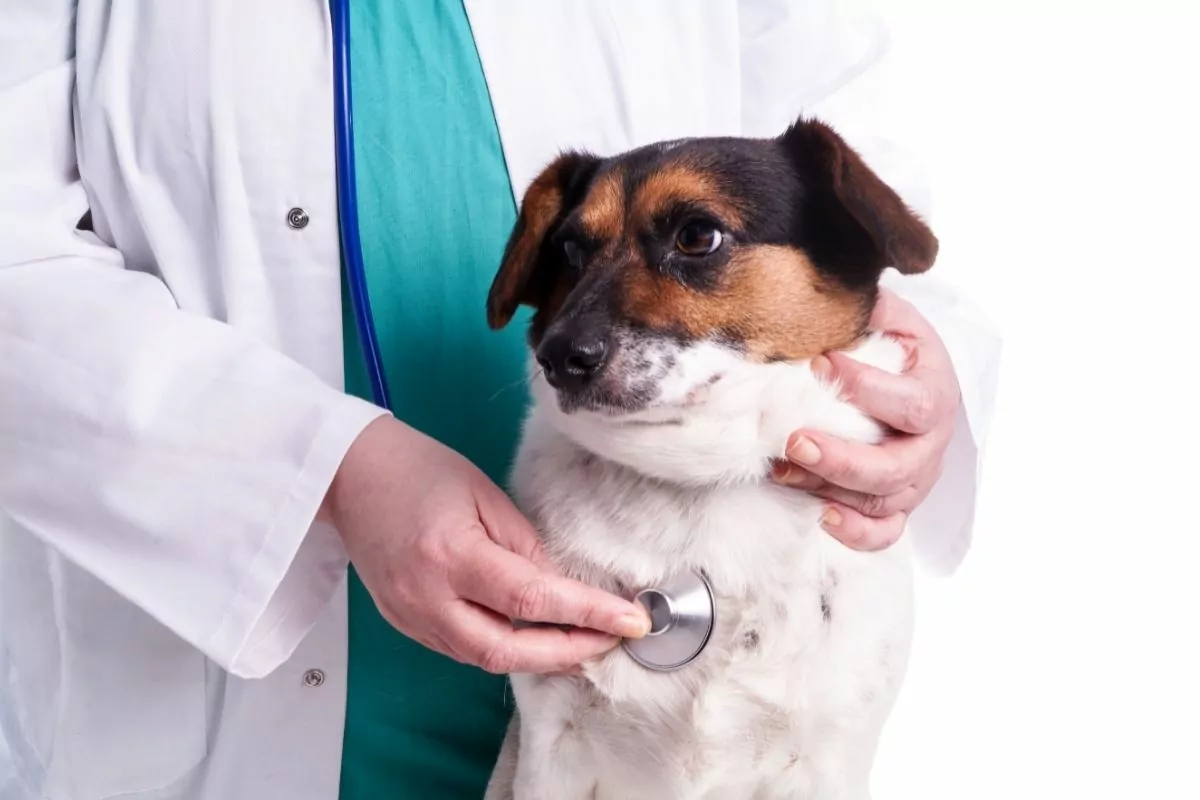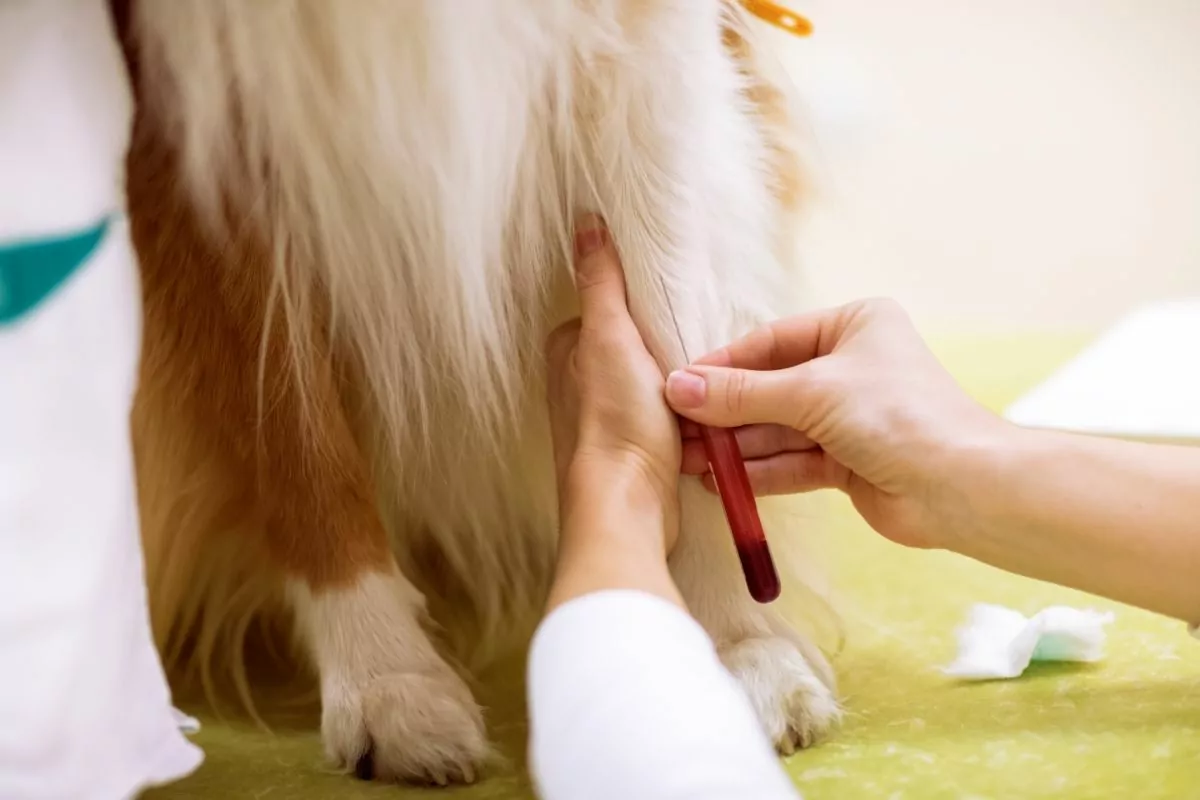Why is my dog wheezing? Is it sick? Is it something I did wrong? How can I help it feel better fast? Your pet’s health is essential, and so are the questions that come with caring for them.
Wheezing can be a sign of illness. Owners should know the difference between a simple cough and when to go to the vet.
Read on for more information on what causes dogs to wheeze and what you should do when they do!
Should You Be Concerned About a Wheezing Dog?
A wheezing dog usually has an issue with its respiratory system. If you notice that your dog has trouble breathing, make sure to take them to a veterinarian as soon as possible.
Wheezing can be a sign of two severe conditions:
Allergic Bronchitis: This makes your dog’s breathing very difficult and can be caused by allergies, or environmental irritants.
Asthma: This is a more severe form of respiratory disease that can cause your dog to have trouble breathing even without exposure to an allergen.
Both of these conditions can easily be treated, and your dog can live a happy and healthy life after diagnosis and treatment.

The Most Common Causes of Dog Wheezing
Wheezing in dogs can be caused by a variety of factors. The following is a list of the most common causes:
Collapsing Trachea or Bronchitis
Tracheomalacia (collapsed trachea) is when the airways to your dog’s lungs collapse, causing them to wheeze. It is most common in small breed dogs, especially flat-faced ones, like Pugs, Bulldogs, etc. You can usually hear a wheeze by listening to your small dog’s chest. The wheezing will sound crackly, like a whistle or Whoopee Cushion.
If your dog is young and has a history of coughing, especially before they are three years old, then they’re most likely suffering from a collapsed airway.
Bronchitis is when their airways become inflamed, making it hard for your dog to breathe.
Allergies
Dogs can develop allergies the same way that humans do. Pollen, mold, dust mites, and cigarette smoke are the most common allergens.
Certain chemicals, foods, and even bug bites can also cause your dog to have allergic reactions! Your dog might react to the allergens by becoming itchy, overly tired, or by finding it difficult to breathe. Dogs that spend a lot of time indoors are commonly prone to developing allergies.
Heart Disease
Dogs suffering from heart disease may develop a cough or wheeze due to the heart not getting enough oxygenated blood to the lungs.
Sinus Infections
Your dog probably has a sinus infection if its symptoms include green or yellow nasal discharge and other signs of having a cold.
A dog’s sinuses are behind its nasal passages, and when they become clogged with mucus, it can be hard for them to breathe.
Foreign Body
Dogs (especially small-breed types) can accidentally inhale foreign objects that get stuck in their lungs. These foreign bodies can cause your dog to cough, sneeze, and shake its head as though it has a cold.
Your dog might have inhaled something unusual if they paw at their face or have trouble breathing or eating.
Heartworm
Heartworm is a parasitic worm that lives in dogs’ hearts and blood vessels, causing trouble breathing. It is common in areas with warm weather, and can cause your dog to wheeze, cough, and become lethargic.
Infections
A simple cold can transform into pneumonia and cause your dog to have trouble breathing and make them wheeze.
How Is Wheezing in Dogs Diagnosed?
Your vet will diagnose your dog’s wheezing and other respiratory symptoms by doing a complete physical exam and listening to its breathing.
Here are the most common tests done for your dog’s wheezing, along with their reasons:
X-rays
X-rays are great for looking at your dog’s chest, nose, and throat. They can help your vet find out if there’s anything in your dog’s airways, such as an object or tumor.

Blood Tests
Tests on blood samples can help your vet diagnose your dog’s liver, heart, or kidneys problems.

Allergy Tests
If you think your dog might have allergies, an allergy test can help diagnose it.
Heartworm Test
If you take a blood sample and assess it for heartworms, using a microscope or a laboratory, you can determine if your dog has heartworms and how many there are.
What to Do When Your Dog Starts Wheezing
Here are some things that you can do if your dog starts wheezing:
- If you suspect your dog is choking, lay them down on their side and get behind them
- Put a broom or a heavy book under their back and lift them
- Place them on their backs in a carrier, and then place the carrier on a table, if you have one. If you don’t have access to a table, you can put your dog on the floor and lift one end to a 45-degree angle
- With their head tucked beneath your arm, stand behind them. If you don’t have anything to lift your dog with, raise them with one hand supporting their chest and the other supporting their back. Clear whatever is obstructing their airway with this approach
- Start CPR (cardiopulmonary resuscitation) if you can’t get air in your dog’s lungs after doing the other techniques
- If you’re not sure how to perform CPR, call your vet and/or the nearest emergency vet clinic
What Not to Do When Your Dog Starts Wheezing
- Don’t panic- keep yourself and your dog calm
- Don’t give your dog anything to eat or drink because they might receive anesthesia
- Avoid over-petting your dog. You might excite them, which can lead to more trouble breathing
- Don’t delay taking them to the vet, especially if it looks like they’re choking or having an asthma attack
Treatment Options for Dog Wheezing
Treatment options will depend on what is causing your dog to wheeze. Here are some options your vet might have:
When it comes to foreign bodies, your veterinarian will most likely sedate your dog and use medical devices to remove the foreign body. If your dog wheezes because of an infection, its treatment will revolve around treating the condition.
Your veterinarian will prescribe medication that helps rid your dog of the worms for heartworms. Unfortunately, there are currently no approved drugs or surgeries to remove adult heartworms; however, your vet can recommend treatment options based on how severe the infection is and which other medications your dog takes.
If your dog’s wheezing results from allergic asthma or bronchitis, your veterinarian will prescribe medication to control your dog’s symptoms.
Your veterinarian might prescribe medication to help keep your dog’s heart beating properly and make breathing more manageable in the event of heart disease. You’ll want to go to a board-certified veterinary cardiologist to find the best strategy for helping your dog live a longer, happier life.
Rest, good hydration, and exercise are essential treatment options for the cold. In addition, keep an eye out for signs that indicate your dog has difficulty breathing (bluish skin color or gums, fainting, etc.). Take your dog to the veterinarian if you notice any of these symptoms.
Prevention Goes a Long Way…
Prevention is the best way to manage your dog’s wheezing. Here is what you can do:
Treat Heartworms: If your dog is diagnosed with heartworms, you can get medicine to help with that. Also, make sure your dog is on heartworm preventatives.
Clean your dog’s ears: If your dog has an ear infection, that can lead to respiratory problems. Clean your dog’s ears regularly to avoid this.
Watch for Fleas: Fleas and other parasites can cause all kinds of health issues in dogs, such as respiratory issues.
Keep your dog away from cigarette smoke: Cigarette smoke can damage a dog’s lungs and make them wheeze.
Allergies: If you can identify your dog’s allergens, take steps to avoid them.
If your dog is allergic to fleas or dust, make sure that you clean their environment well and remove anything that might be causing them to sneeze and wheeze.
You should also avoid playing with your dog too much if it’s gasping.
What Does Dog Wheezing Sound Like?
Dog wheezing can sound like different things. Here are the most common reasons that dogs wheeze and what it sounds like:
Allergies
If your dog is wheezing because of allergies, it can sound like a short, quick bark.
Heartworms
If your dog sounds like they are gasping and not because of allergies, it most likely has heartworms. This type of wheezing can sound like goose honking. If it’s combined with coughing, then your dog has heartworms.
Infection
If your dog is wheezing due to an infection, it can sound like a goose honking or resemble quick, short bursts of breath.
Asthma
Asthma can sound like a combination of wheezing and fast breathing sounds.
When to Take Your Dog to the Vet for Wheezing
If your dog is wheezing nonstop, or its gums have a blueish tinge to them (indicating that it isn’t getting enough air), you’ll need to take it to the vet.
If your dog has a history of heartworms, asthma, infection, or other respiratory conditions, you should take them to the vet for regular check-ups.
You should also take your dog to the vet if it starts wheezing out-of-the-blue, and for no known reason.
Why Do Dogs Wheeze?
Stridor (a harsh whistling sound) indicates that your dog has an obstructed or restricted windpipe. Swollen and inflamed airways, anything lodged in the windpipe, or various medical conditions can all contribute to why your dog is wheezing.
A few seconds of wheezing is unlikely to be a cause for concern, but if your dog is frequently wheezing and has other symptoms, then take your dog to the vet.
The Difference Between Reverse Sneezing and Dog Wheezing
Reverse sneezing in dogs is when your dog makes a loud and high-pitched noise while their stomach pushes out and in quickly. Wheezing is when your dog makes a wheezing noise, and its stomach doesn’t push out or in quickly. Reverse sneezing sounds like a snoring wheeze, and wheezing sounds more like a goose honking.
Reverse sneezing can happen when your dog is super excited or during an intense play session. Other times it can happen out of nowhere, and that can be pretty scary. Your dog will make loud snoring sounds and look like they are choking or coughing (because their entire body will contract during the sneeze).
Prognosis and Outcome of Dog Wheezing
If your dog has allergies, taking the right steps to avoid their allergens will cure wheezing. When your dog is short of breath, or their gums look blue, they’ll need immediate veterinary attention.
It’s essential to take your dog to the vet if it seems like they are choking or having trouble breathing. If you try to treat them yourself (without getting professional veterinary care), you could endanger your dog further.
If your dog is wheezing, it could be a sign of something serious.
Wheezing can be caused by allergies, asthma, or even heart disease in dogs. It’s essential to get your pet checked out right away if you suspect that they are wheezing. The sooner you catch the problem, the better chance to help them feel better and get them back to their usual self!
